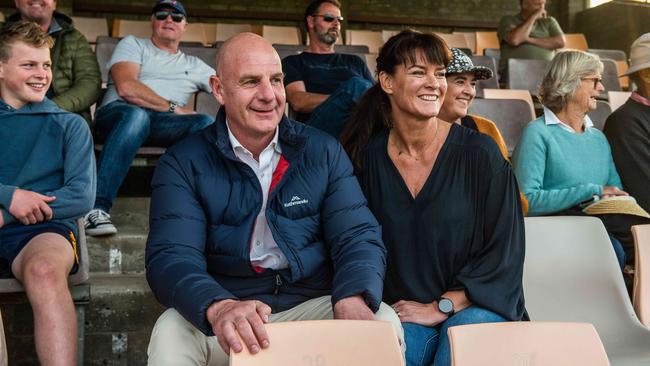
As of late counting on Sunday, the Liberals were closing in on the magic 13th seat necessary to form majority government, with 12 already in the bag.
If confirmed, with a second Liberal getting up in Hobart-based Clark, it will be an extraordinary achievement, however slim the margin.
Majority governments are hard-won under Tasmania’s Hare Clark system of proportional representation.
To secure three in a row — 2014, 2018 and 2021 — would be a triumph for the Liberal Party.
This election was designed to capitalise on stratospheric approval ratings for the Premier, the gruff former publican who took over the reins of power from Will Hodgman in January 2020, just before COVID hit.
As graciously observed by unsuccessful Labor leader Rebecca White on Saturday night, Gutwein and Tasmania’s public health officials took the necessary steps to effectively eradicate the virus from the island, thus far.
The excuse for the election — that the Liberals had fallen into minority with the departure from the party of Speaker Sue Hickey — was flimsy.
As noted previously, Hickey had guaranteed supply and confidence, as had Madeleine Ogilvie, the former Labor MP-turned independent who joined the Liberals once the poll was announced, instantly undermining Gutwein’s justification.
Labor’s accident-prone first 10 days of the campaign — ALP national executive intervention over a preselection and a public slanging match between the state president and Ms White over his dumping as a candidate — swelled Liberal hopes of a multi-seat majority.
That this was averted owes everything to White holding her nerve. With impressive levels of endurance and determination, she redoubled Labor’s focus on the failings of the health system, a theme that played into the rise of independents in Clark, home of the struggling Royal Hobart Hospital.
The swing against Labor — in the region of 4 per cent — would have been worse if not for this strong finish.
Even so, Gutwein is within a surplus vote carve-up of securing the record third term — and first in his own right — that he gambled his career on.
For White, the knives were out even before polling day, with sections of the Left already discussing a leadership challenge to install long-time leadership aspirant David O’Byrne.
White, however, has much goodwill within the parliamentary Labor Party and probably the broader membership.
Under state ALP rules, following an election loss the leadership is opened to nominations. White has been so far silent on her desire or otherwise to battle on.
She could have a fight on her hands if the powerful Left-aligned Health and Community Services Union and United Workers Union back O’Byrne.
However, there is serious talk of Labor’s national executive intervening again, this time more fulsomely, to effectively run the Tasmanian branch for a period.
The aim would be to end infighting and restore the art of factional deal-making.
Stakes are high, not only for a state party that has failed at three successive elections; federally, Labor hopes to retain Lyons and win back Bass and Braddon as vital stepping stones on the path to an Albanese victory. That requires peace and co-operation within the state party and an end to headlines of division and derision between senior party operatives.




Peter Gutwein’s gamble appears to have paid off, but by the kind of margin that would have a professional punter biting his nails.